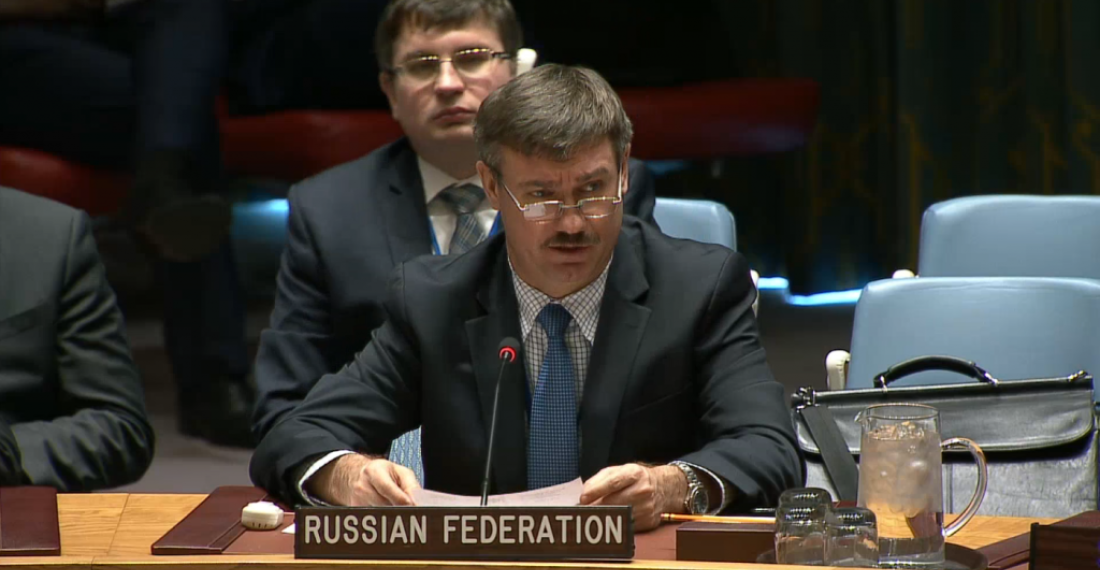Senior Russian official Pyotr Ilichev, who is the director of the Department of International Organisations of the Russian Foreign Ministry, has expressed his opposition to a UN peacekeeping mission to Nagorno-Karabakh in an interview with Russian state media oulet RIA Novosti on Wednesday (8 February).
"The activities of Russian peacekeepers are supported both in Baku and in Yerevan, which is of key importance in the conditions of uncertainty of the final status of the territory," said Ilichev. He also claimed that "the Russian peacekeeping contingent remains the only guarantor of maintaining stability in the Nagorno-Karabakh conflict zone. There is no need to give it a mandate to the UN because the modalities of our peacekeepers are already clearly fixed in the first trilateral statement of the leaders of Russia, Azerbaijan, and Armenia of November 9, 2020."
In his interview, Ilichev argued that the involvement of other international organisations in peacekeeping in Nagorno-Karabakh would be difficult because they could not "maintain an equidistant position with the parties". He also questioned the viability of the UN Security Council deploying a mission once the current mandate for the Russian peacekeepers expires, saying, "in some cases, the host countries favour the withdrawal of the Blue Helmets because of their low efficiency. Therefore, the question is not so much who authorises the peacekeeping operation, but rather the goodwill of both parties to the conflict to end it and eliminate its consequences."
He also argued that "the practical implementation of the idea of sending an international peacekeeping contingent, which will also require UN Security Council sanctions, is hardly realistic."
The background
Ever since self-proclaimed Azerbaijani environmental activists began protesting and allegedly obstructing traffic along the Lachin Corridor linking Armenia with the Armenian-populated region of Nagorno-Karabakh on 12 December 2022, Armenia has grown increasingly frustrated with Russian peacekeeping forces who are mandated to ensure the Corridor stays open.
Armenia argues the actions of the protesters constitute a blockade of the region, while Azerbaijan maintains that the Corridor remains open for humanitarian goods.
In a meeting with the Russian Prime Minister Mikhail Mishushtin on 2 February, Armenian Prime Minister said:
"You know that the Lachin corridor has been blocked for more than a month, which, according to the Trilateral Statement of the President of the Russian Federation, the President of the Republic of Azerbaijan and the Prime Minister of the Republic of Armenia, should be under the control of Russian peacekeepers. Now it turns out that the Lachin corridor is not under the control of Russian peacekeepers, which creates specific problems."
At a press conference on 10 January 2023, Armenian Prime Minister Nikol Pashinyan did not rule out requesting a UN Security Council-led peacekeeping mission to Nagorno-Karabakh once the current mandate of Russian peacekeepers expires after 2025.
"We have said that if Russia becomes unable to provide security of the Nagorno-Karabakh population, the UN Security Council may be asked to deploy an additional international peacekeeping mission," Pashinyan said, adding that they are currently unable to do so because "that would mean we are applying to the UN Security Council against Russia."
"One thing is clear: after 2025, when the term of operation of the Russian peacekeepers expires, we should make decisions based on the situation. Perhaps, it wouldn't be necessary to apply to the UN Security Council or, maybe, it would," Pashinyan added.
source: commonspace.eu with agencies
photo: Pyotr Ilichev



